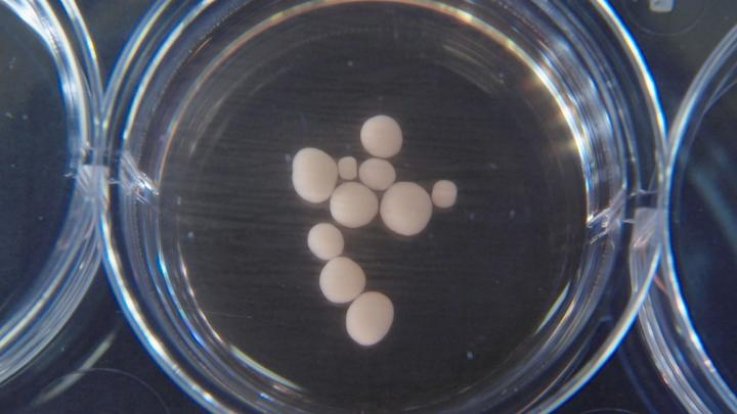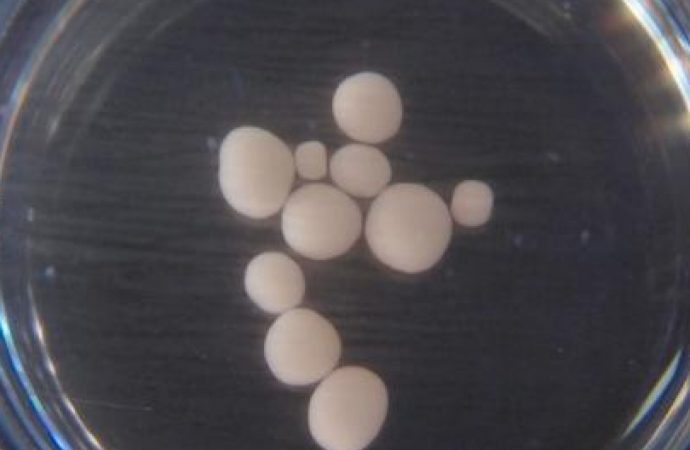In recent years, scientists have made impressive headway with organoids—clumps of tissue or bundles of cells that resemble a miniature version of a human organ. But as the technology continues to progress at rapid speeds, are the ethical considerations playing catch up?
Source: Newsweek
A group of researchers is scheduled to speak at the Society for Neuroscience meeting in Chicago today to discuss the ethical implications of organoid-based research, The Guardian reports. They argue that some scientists working with organoids risk crossing ethical lines and could unwittingly cause their biological creations to suffer, were they to become conscious—and that some may have already crossed that line by creating sentient tissue.
It’s never too early to start this discussion, says Alysson R. Muotri, a professor in the Department of Pediatrics/Cellular & Molecular Medicine at the University of California in San Diego. (Muotri is not one of the researchers scheduled to speak.)
“While we have no evidence that this is the case now, there are now very robust protocols that can generate sophisticated activity from these organoids. Thus, I think this is possible in the future,” he told Newsweek. “I think we need to inform the society about the gradual steps of science, instead of taking people by surprise.”
The last decade or so has seen major improvements in researchers’ abilities to create mini 3D models of human organs using stem cells. These undifferentiated cells can be cajoled into different types of tissue and thus different types of organ, from the intestine to the heart or kidney.
By and large, these don’t pose too much of a dilemma and can be hugely beneficial to biomedical research—they sidestep the problem of differences between human and animal biology that hamper progress with traditional methods that involve animal testing, as well as the ethical questions that come with such research.
But the development of brain organoids—and studies that have detected brain activity in these organoids—raises questions over whether it is possible for them to achieve consciousness and, if it is, whether these experiments could cause suffering.
“We don’t want people doing research where there is potential for something to suffer,” Elan Ohayon, the director of the Green Neuroscience Laboratory in San Diego, California, who will be talking at the conference today, told The Guardian

The brain organoids that exist as of right now are roughly the same size as a lentil and contain (a relatively tiny) 2 to 3 million cells. The human brain, in contrast, has billions of cells.
Right now, the risk of organoids becoming sentient is “tiny,” Hank Greely, a professor of law at Stanford University, told Newsweek. “About at the same level as the risk that your cell phone is in agony whenever it has to play a particular ring tone. In 10 to 20 years, though—who knows?”
However, studies have reported being able to detect brain activity. In August, researchers said brain waves were being produced two months into a 10-month growing process—which, Newsweek reported at the time, was described as ‘unprecedented.’ The team was able to compare the activity to that seen in premature babies, concluding activity was equivalent to that seen in babies born 25 to 39 weeks after conception.
The data was “over-hyped,” said Madeline Lancaster, a group leader in the Medical Research Council (MRC) Laboratory of Molecular Biology at the University of Cambridge.
“Those were not brain waves,” she told Newsweek. “Many brain tumours removed from patients have more neurons and more organization, but no one is concerned about them being conscious.”
The study’s authors were also keen to emphasize the point that it does not mean it was sentient but it does highlight how fast-moving progress in this field of research has become. Ohayon told The Guardian, “If there’s even a possibility of the organoid being sentient, we could be crossing that line.”
He will be arguing for greater checks to reduce the risk of crossing the line and for freezing research that risks organoids becoming conscious or involves implanting human brain organoid implants into other animals (like mice). It’s a controversial argument that many in the field argue is not only unnecessary but risks stalling progress that would benefit many people with conditions and diseases related to the brain.
“I think the discussion is great to have, but to suggest a moratorium be put in place is absurd,” said Lancaster. “There are real, actual sentient people suffering from neurological conditions with no cure because science does not have a good model.”
“Brain organoids represent one of the first good models,” she continued. “To put a stop to that research would hold off those future treatments, and I would not want to be the one responsible for preventing those people from finally getting the treatment they deserve.”
As for the likelihood of organoids developing sentience, “brain organoids lack the size, organization, and sensory input all necessary to form the basis of sentience,” Lancaster explained.
“Obviously, if brain organoids ever did develop the number of neurons, the overall organization, and the ability to sense and interact with their environment, then those tissues would need to be regulated. But only if all three conditions were met, and we are miles away from that.”
Greely echoes these thoughts. “The human suffering is clear. The organoid suffering is highly unlikely,” he said. “The proposal for a moratorium should not be taken seriously.”
But it is not the first time scientists have raised the ethics question. In 2018, a group including biologists and philosophers discussed the problems around research involving human brain surrogates—a category that involves ex vivo brain tissue and chimeras, as well as organoids.
In the article, published in Nature, the authors asked:
“If researchers could create brain tissue in the laboratory that might appear to have conscious experiences or subjective phenomenal states, would that tissue deserve any of the protections routinely given to human or animal research subjects?”
“It’s incredibly important that the research be able to go forward in order to alleviate a tremendous amount of human suffering that arises from injury to the human brain,” Nita A. Farahany, a leading expert on the ethical, legal and social implications of biosciences, told Aristos Georgiou at Newsweek.
“But some of the questions about how to ethically make progress in this area, include asking some difficult questions.”
Source: Newsweek

































Leave a Comment
You must be logged in to post a comment.